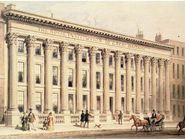University of Cambridge Tourist attraction in Cambridge, United Kingdom
Newton was a fellow of Trinity College and the second Lucasian Professor of Mathematics at the University of Cambridge. He dedicated much of his time to the study of alchemy and biblical chronology, but most of his work in those areas remained unpublished until long after his death. Newton served two brief terms as Member of Parliament for the University of Cambridge, in 1689 and 1701.
Source: Wikipedia
Francis Crick worked at University of Cambridge doing some researches on DNA.
Source: Wikipedia
In October 1850, already an accomplished mathematician, James Clerk Maxwell left Scotland for the University of Cambridge.
Source: Wikipedia
In 1893, the University of Cambridge in England awarded Pyotr Tchaikovsky an honorary Doctor of Music degree.
Source: Wikipedia
C. S. Lewis held academic positions in English literature at Cambridge University.
Source: Wikipedia
In the early 1950s, the new science of paleomagnetism pioneered at the University of Cambridge by S. K. Runcorn was soon producing data in favour of Alfred Wegener's theory.
Source: Wikipedia
